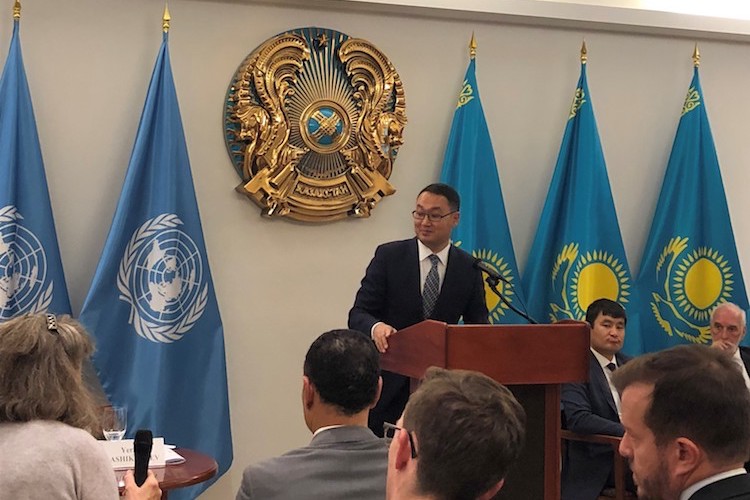By Santo D. Banerjee

NEW YORK (IDN) – High Representative for Disarmament Affairs Izumi Nakamitsu has expressed her “gratitude” to the Kazakhstan for their continued partnership with the UN Office for Disarmament Affairs (UNODA), including through a series of Nuclear Discussion Forums (NDF), now in its eighth year.
She was addressing a side event of the UN General Assembly’s First Committee on October 18 at the Permanent Mission of Kazakhstan to the United Nations. The event featured a panel discussion about Consolidating and Enhancing Cooperation among Nuclear-Weapon-Free Zones (NWFZs). It was chaired by Yerzhan Ashikbayev, the Deputy Foreign Minister of Kazakhstan.
Resolution 3472 B (1975) of the United Nations General Assembly (UNGA) defines a NWFZ as: “…any zone recognized as such by the General Assembly of the United Nations, which any group of States, in the free exercises of their sovereignty, has established by virtue of a treaty or convention whereby:
“1. The statute of total absence of nuclear weapons to which the zone shall be subject, including the procedure for the delimitation of the zone, is defined; 2. An international system of verification and control is established to guarantee compliance with the obligations deriving from that statute.”
Nakamitsu also commended Ashikbayev for his “active and personal dedication to nuclear disarmament and non-proliferation and Kazakhstan for its contribution to the establishment of a nuclear-weapon-free zone in Central Asia”.
Deputy Foreign Minister Ashikbayev opened the discussion by highlighting the importance of NWFZs which, he said, are essential for creating a safe and nuclear-weapon-free world, although their potential is yet to be fully realized. The international community should strengthen NWFZs as articulated in the Secretary-General’s Disarmament Agenda.
Following these remarks, the UN High Representative for Disarmament Affairs noted that States are showing increased dedication to NWFZs. Almost 60 percent of the UN membership have committed to them.
“Nuclear-weapon-free zones can be considered success stories,” Nakamitsu said. However, she cautioned that much work remains to be done. Nuclear weapons possessor states are yet to ratify the protocols to the treaties establishing NWFZs and there is a lack of progress in establishing new zones, especially in the Middle East. More cooperation is also needed between the zones.
The second speaker was the Secretary-General of the Agency for the Prohibition of Nuclear Weapons in Latin America and the Caribbean (OPANAL), Luiz Filipe de Macedo Soares. He explained that consolidation involves several aspects.
All states within a NWFZ must firstly become parties to the relevant treaty. Once this is achieved, nuclear weapons possessor states must be encouraged to ratify the protocols. Furthermore, there should be collaboration between different NWFZs.
John Borrie, Chief of Research at the UN Institute for Disarmament Research (UNIDIR), summarized the Vienna Center for Disarmament and Non-Proliferation (VCDNP)’s Task Force Report, Cooperation among Nuclear-Weapon-Free Zones: History, Challenges and Recommendations. He noted that collaboration between the NWFZs is both necessary and desirable.
“Steps can be taken which are neither demanding nor very costly,” maintained Borrie. These could include communication and institutionalization of contacts; research and analysis; cooperation with international organizations; and disarmament education.
The Permanent Representative of Mongolia, Sukhbold Sukhee said that NWFZs are contributing to confidence-building and emerging as a standout in disarmament efforts. Mongolia supports efforts for a fourth conference of the zones in 2020, he added.
In the ensuing discussion, a member of the audience commented that collaboration between NWFZs was unlikely to persuade nuclear possessor states to sign the relevant protocols. The OPANAL Secretary-General responded that increased cooperation could have other benefits, such as enhancing the influence of signatory states.
Asked whether progress could be achieved by creating single-state NWFZs. Mongolia’s Permanent Representative expressed doubts, noting how it was difficult to create the zone in Mongolia.
Another question concerned the status of Latin America and the Caribbean’s efforts to negotiate with nuclear possessor states about ratifying the Treaty of Tlatelolco. The OPANAL Secretary-General said it had engaged in consultations, but the outcome had been negative.
The opening for signature in 1967 of the Treaty for the Prohibition of Nuclear Weapons in Latin America and the Caribbean (Treaty of Tlatelolco) established the first NWFZ in a permanently populated territory of the planet.
The Latin American and Caribbean initiative went on to inspire the establishment of four other NWFZs: South Pacific (Treaty of Rarotonga, 1985); Southeast Asia (Treaty of Bangkok, 1995); Africa (Treaty of Pelindaba, 1996); Central Asia (Treaty of Central Asia, 2006) and the territory of Mongolia, which in the year 2000 gained international recognition as a State free of nuclear weapons (UNGA Resolution 55/335). [IDN-InDepthNews – 23 October 2018]
Related article > Full Potential of Nuclear Weapon-Free Zones Has Yet to be Recognised
Photo: Yerzhan Ashikbayev, the Deputy Foreign Minister of Kazakhstan, chairing a side event at the Kazakh Permanent Mission to the UN in New York. Source: UNODA
IDN is flagship agency of the International Press Syndicate
facebook.com/IDN.GoingDeeper – twitter.com/nukeabolition






